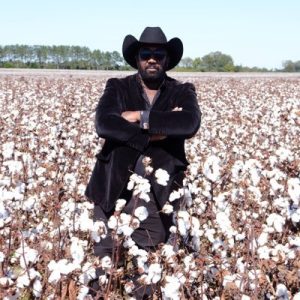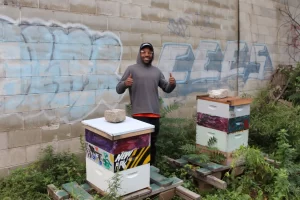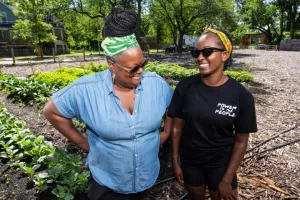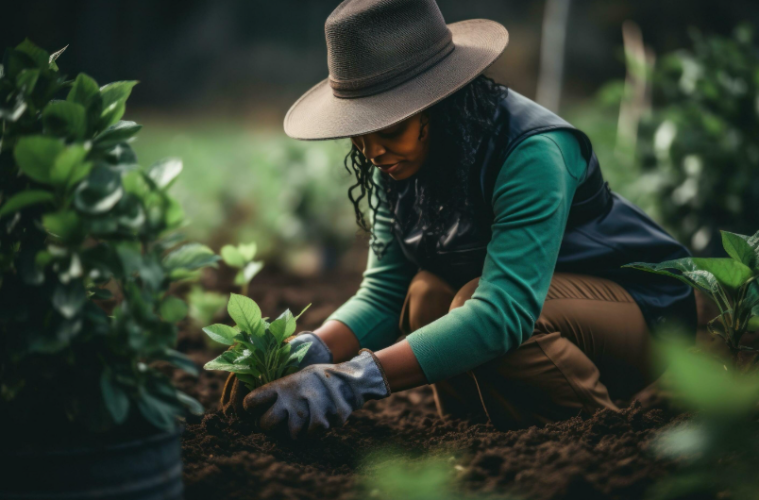With a more crucial need to become self-sustainable, families of color are becoming the most
vulnerable within the economic shifts during Trump’s administration. The Black community is
disproportionately impacted by the lack of healthy and affordable food resources, making it
more difficult to obtain food security amidst unpredictable market changes. This prompts a pivot
towards the investment of homesteading, a lifestyle of food production and goods exchanged
within the means of local cooperation.
The knowledge and support of Black farmers and gardeners are the most vital in trusting the
methods and adjustments of feeding and sharing green spaces without intervention of systemic
forces. In the United States, Black farmers own less than 2% of farmland, approximating to
nearly 38,000 documented as of 2024. However, this is declining due the shortage of
emergency loans and the struggles of gaining capital for land projects assisting communities of
color.
Luckily, there Black farmers and gardeners that are beating the odds from discrimination of
resources and finding ways to fight back with their neighborhoods through skill sharing and land
ownership.

Asia Spratley – Owner of Yellow Door Urban Homestead
A mother of two living in Hopewell, Virginia, Sprately shares tips and education for all gardeners along their journey with a no-nonsense attitude. Raising her daughter activated her desire to grow her own food and help others within her community adopt healthy eating practices for their families. She’s prided her work in having an informal background of learning how to garden, which helps other growers relate to her content and view how they can get started in their own unique ways.
Her viral gardening videos can be streamed on Youtube, where she teaches the importance of soil health, sun and shade presence, foodscaping and more. She’s been featured in VPM Science Matters, Humans Who Grow Food, and Exploring Alternative. Watch her continue to blossom at Yellow Door Urban Homestead on Youtube.

John W. Boyd – Founder of The National Black Farmers Association
Born in Queens, New York, Boyd is a fourth generation farmer who’s on a mission to fight for the agricultural rights of Black landworkers. His civil rights advocacy has led him and NFA members to march on the White House, become appointed by Bill Clinton to serve on his tobacco commision during his administration, and receive the Legacy of Excellence “Keeper of the Flame” Award in 2005.
He continues to serve on forums that guide Black farmers towards financial resources, including federal programs administered by the U.S. Department of Agriculture. His outreach and community organizing has inspired more people to confront the racial discrepancies within the farming industry, creating a larger network of Black farmers honoring their heritage through resistance. Learn more about the NFA collective at www.blackfarmers.org

Marcellus Counts – Founder of Apiary in the Sky
Counts has created quite the buzz with his work as a Black beekeeper serving in community gardens within the Tri-state area. He is a wildlife conservationist who combines his love of art and nature to create environmental justice workshops in his home of Newark, New Jersey. Youth enrichment is at the heart of his passion of centering food justice in low-income neighborhoods where children are most impacted. Teaching beekeeping is his way of giving back through mentorship and encouraging kids to appreciate nature and food sources that will support their generation for years to come.
Amongst other offerings, he helps other green spaces with grant writing sessions, families with food pantry gatherings, and community art programs with honey sharing. See what Counts is up to next at @apiaryinthesky on all social media platforms.

Clarenda “Farmer Cee” Stanley – CEO of Green Heffa Farms
For the love of healing, Farmer Cee has built a wellness sanctuary out of her fifteen acre farm in North Carolina that is rooted in ancestral wisdom. As an herbalist and activist for sustainable living, her goals of Green Heffa Farm surround the culmination of honoring the environment and those who came before us, especially Black healers. She teaches herbal medicine classes and hosts donation-based retreats on her farm for Black women to visit and heal in privacy.
Her gardening practices pay tribute to her grandparents and the farm they’d raised her on. She hopes that her herbal teas and other freshly grown products help people connect to nature and identify with what they need to learn from the earth. She gained her rep as a herbal practitioner with her own natural pharmacy, which coined her name “Farmer Cee.” Learn more about how she’s expanding her brand at www.greenheffafarms.com.

Mecca Bey and Bweza Itaagi – Co-owners of Sistas in the Village
Devoted to land stewardship and economic empowerment, Sistas in the Village is a Black, Brown and Indigenous collective that grows organic foods available to at-risk communities in Chicago. They believe their ability to garden is a revolutionary act, and they are empowered by their volunteer team to keep their operations running on their seven acre property. In fact, some of their team of volunteers are from the local neighborhoods who bring their cultural practices of African farming methods, Middle Eastern medicine-making, and more.
Their garden offers a free apothecary with free herbal remedies for the community, online business workshops for farmers, and in-person maintenance support to local gardens. Check out their upcoming special programs at www.sistasinthevillage.com.
Now more than ever, we are reminded of Black people’s resilience as it is mirrored in nature. The ability to connect to other Black earth workers who are helping communities become stronger one seed at a time is perhaps the primary signal that we will survive what’s yet to come. In doing so, we are stepping into the powers of our ancestors who communicated through crops and cornrows, and led each other to freedom by learning from the stars and trees. As we support the work of those mentioned above and many others not included, we are nurturing the earth in return as we take care of the land, and each other.
Want to learn more from and support Black farmers and gardeners in your area? Check out the Black Farmers Index.




